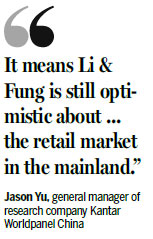

JV planned to develop fashion brands and home products
Li & Fung Ltd plans to open 300 outlets in the Chinese mainland under a joint venture with two major department stores to develop fashion brands and home products.
The Hong Kong-based retail sourcing company will take a 20 percent stake, with Shanghai Bailian Group Co and Beijing Wangfujing Department Store Group Co Ltd each owning 40 percent, the companies said in a joint statement.
With an initial registered capital of 48 million yuan ($7.7 million), the business will target sales of 1 billion yuan in three years.
Jason Yu, general manager of research company Kantar Worldpanel China, said: "It looks an ambitious plan with 300 stores, but it means that Li & Fung is still optimistic about the long-term prospects of the retail market in the mainland and consumers' willingness to pay for high quality products."
The deal could help Li & Fung, which gets more than 60 percent of its revenue from the United States, make up for some of the Wal-Mart Stores Inc business it recently lost. The partnership also paves the way for it to tap demand from the mainland's burgeoning middle class.
Beijing Wangfujing Department Store Group Co Ltd, with 46 chain department stores in 30 cities around the country, has expanded to new business formats by opening shopping centers last year.
Shanghai Bailian has more than 5,000 stores and its annual sales volume reached 38 billion yuan in 2014. It is a major retail player in the southern and eastern regions of the country.
Both mainland companies are looking to diversify from traditional department stores after facing fierce competition from e-commerce and specialist retailers.
Yu said the tie-up looks good on paper. The mainland companies have strong brand names while Li & Fung has a brilliant global sourcing network. This will help them edge ahead of other brick-and-mortar retailers.
In the last few years, Li & Fung has gone through a challenging period. The company sources individual fashion labels and home appliances from Asian manufacturers for global retailers such as Marks & Spencer in the United Kingdom and Wal-Mart in the US.
As demand in the US and Europe weakened, Li & Fung has suffered the fallout, Yu said. In comparison, the development of individual fashion labels and home appliances for department stores in China has been limited and represents less than 1 percent of the total market.
"But that is likely to change as more local retailers in the country are starting to understand the importance of selling their own brands," Yu said.
At the close of trading on Tuesday, Li & Fung shares fell 0.9 percent in Hong Kong to HK$6.62, Bailian rose 2.17 percent to 23.59 yuan and Wangfujing climbed 4.1 percent to 36.21 yuan in Shanghai.
wangzhuoqiong@chinadaily.com.cn
